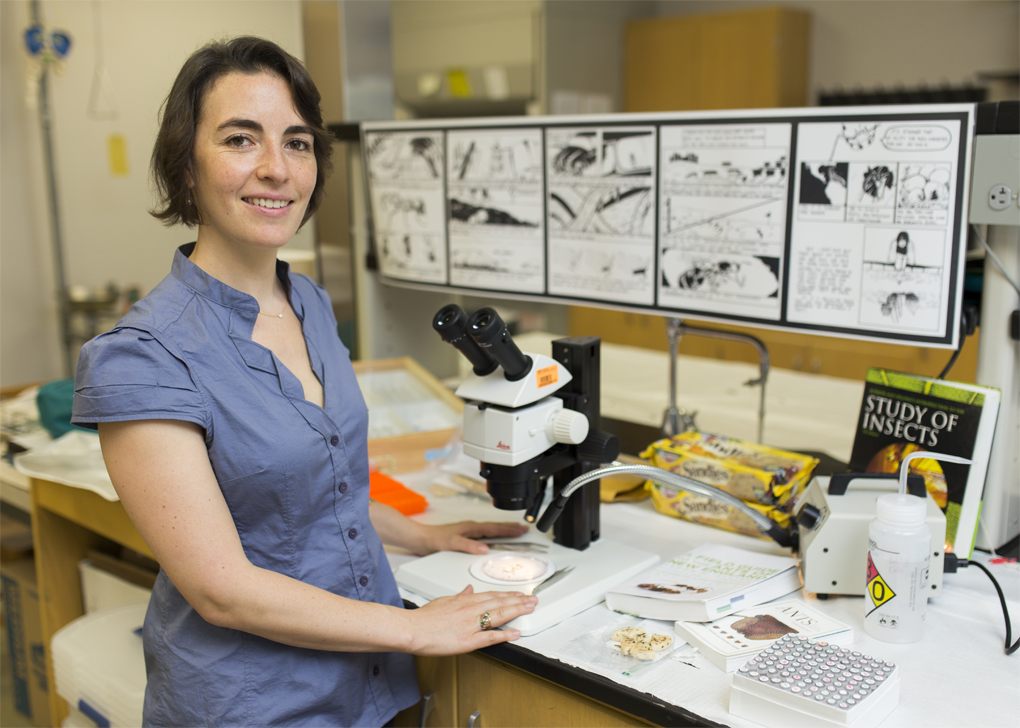When Kayli Sieber sat down for a lecture on the history of taxonomy and categorization of insects, she expected a repetition of previous history-based lectures. But when the University of Florida senior biology student heard her teacher Andrea Lucky, Ph.D., speak about the topic, she was fascinated and hooked on every word.
“Everything she said was so applicable to our own insect collection projects for class,” said Sieber, an entomology and nematology minor. “She shared how insects and all kinds of other organisms are stored in museums for future scientists’ use. Dr. Lucky made the topic really engaging with funny videos and interactive classroom activities.”

This snapshot into a class with Andrea Lucky exemplifies why she was one of two 2019 recipients nationally of the Early Career Teacher Award by the U.S. Department of Agriculture’s National Institute of Food and Agriculture (USDA-NIFA). The assistant professor in the UF Institute of Food and Agricultural Science (UF/IFAS) Entomology and Nematology Department was honored at the 2019 annual meeting of the Association of Public & Land-grant Universities (APLU) in San Diego, California.
UF continues to hold more total (national and regional combined) USDA-NIFA teaching awards than any other institution. The USDA-NIFA recognizes 10-12 faculty members each year nationwide through its teaching excellence awards. Along with Lucky’s award, 18 additional UF/IFAS faculty have received these awards since 1992.
“Our students are the next generation of leaders, and it’s a privilege and huge responsibility to educate them and be such a formative part of their lives,” Lucky said. “I try my best to do what I can for them. I had so many teaching mentors who invested in me along my educational journey and I hope to do the same for my students. An award like this is encouraging because it offers a lot of support and validation that teaching is recognized, appreciated and valued.”
Lucky teaches two courses in the UF/IFAS College of Agricultural and Life Sciences (CALS) – an introductory course about insects and classification for undergraduate students and a graduate entomology course for students looking to work in the discipline. In her classes, Lucky takes a hands-on approach to activities. She enjoys helping students take charge of their own learning so her teaching style “feels more like a partnership” with her students.
“She’s very approachable,” Sieber said. “Sometimes it feels like there’s a wall between professors and students, but it’s not that way with Dr. Lucky. She treats us as equals – just like anyone she would interact with in her professional life. There are no bad questions in her class. That’s huge.”
In Lucky’s insect classification course Sieber is currently taking, students organize, label and identify their own collection of insects they find over the course of a semester. Through this activity that professional entomologists regularly perform, students learn about habitats, data collection and management, nature and where to find insects.
Because of Florida’s diverse environment and numerous shipping ports, the students will often find a new insect to record for the county or state. Lucky encourages them to collaborate with professional researchers at the Florida Department of Agriculture and Consumer Services – Division of Plant Industry in Gainesville to accurately identify the insect species in question.
“This really helps them to network and correctly identify insects while understanding the value of their specimen collections for other researchers, now and in the future,” Lucky said.
Students in Lucky’s graduate-level course write papers for publications that are accessible to the general public. About one-third to one-half of the students in the course actively seek publication of their projects after the course. So far, 30 students have had their work successfully published. Making science relevant to the public is a valuable skillset, Lucky said.
Lucky frequently researches, evaluates and revises her teaching methods to best serve her students. She does this through pre-surveys and post-surveys of her classes, has her teaching peer assessed often, and works with instructional designers regularly to improve her online courses.
“Dr. Andrea Lucky is an exceptional young teacher and mentor, and a person who is deeply motivated to help equip the next generation with the knowledge, perspective and tools to address complex issues,” said CALS Dean Elaine Turner. “Her teaching, research and outreach activities are synergistically woven together to inspire, inform and innovate.”
###
The College of Agricultural and Life Sciences (CALS) administers the degree programs of the University of Florida’s Institute of Food and Agricultural Sciences (UF/IFAS). The mission of the College of Agricultural and Life Sciences is to deliver unsurpassed educational programs that prepare students to address the world’s critical challenges related to agriculture, food systems, human wellbeing, natural resources and sustainable communities. The college has received more total (national and regional combined) USDA teaching awards than any other institution. Visit the CALS website at cals.ufl.edu, and follow CALS on social media platforms at @ufcals.
 0
0
